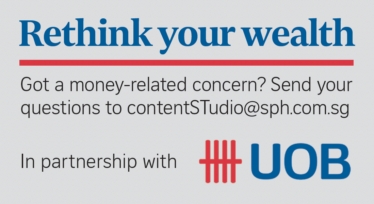BRANDED CONTENT
Whether you're aged 20 or 50, here's how you can start investing amid uncertainty
Mr Abel Lim, UOB’s head of wealth management advisory and strategy, answers your key questions about investing in times of high inflation

It’s never too early to start investing, because having a longer time horizon gives you greater margin for error.
PHOTO: GETTY IMAGES
Follow topic:
Singapore’s core inflation last month hit 4.8 per cent, the highest since end-2008. High inflation doesn’t just mean higher prices – you also risk losing your purchasing power if your income fails to keep up with the inflation rate. Investing can be a good way to hedge against inflation. But where to start? What to invest in?
In this column, Mr Abel Lim, the head of wealth management advisory and strategy at UOB, answers some of your key questions on investing. Mr Lim, 51, oversees the bank’s overall approach and strategies for managing the wealth of a broad spectrum of clients. He was previously head of investment sales and advisory for UOB, and has worked in the bank for 14 years.
Q: Is investing the best way to beat inflation or should I go with the interest from fixed deposits?
A: Before we talk about the returns you would like to achieve, you should first consider risks. This is the central principle behind our Risk-First Approach.
Make sure you and your family are protected with adequate insurance coverage. You should then think about your investment time horizon and risk appetite before you take steps to grow your money.
What are your financial goals? Do you need your savings for shorter-term goals, such as buying a home or paying for your child’s university education? Remember to keep your long-term retirement goals in mind too.
Next, how much volatility can you stomach? In other words, if the market experiences a downturn, how much of a fall in your wealth can you accept?
The answers to these questions will make your decision clearer. A fixed deposit gives you more certainty about your risks and returns over the short term. Investing for potentially higher returns carries risk, but you don’t need to take more risks than you are comfortable with on your investments.
You can adopt what we call “Core strategies”, which are less dependent on market cycles and provide regular income. This could include investing in lower-risk, dividend-paying funds and investment grade corporate bonds. You should try to capture tactical investment opportunities only if you have a higher risk appetite.
Focus on what you can control. The returns on your investment may depend on many factors that are not within your control, but you can control the amount of risk you are comfortable taking.
Q: How should I start investing? Are robo-advisors enough? There’s a lot to learn and I don’t know where to start.
A: Many think that investing is complicated and only for the financially savvy, or that you need to monitor your investments 24/7.
The truth is, investing can be as simple or as complicated as you want it to be. If you’re just starting out, you could look at digital platforms like UOB SimpleInvest, which lets you choose from three fund portfolios depending on your investment goals. These portfolios are crafted and constantly monitored by experts who make adjustments when market conditions change, and it can be just as affordable to tap on experts in this manner as it is to invest with a robo-advisor.

Q: What is a good age to start investing and how much do I need? I know I should start young (I'm in my early 20s) but I also want to enjoy life, especially since travel just recently resumed.
A: You often hear that it’s never too early to start investing. That’s because having a longer time horizon gives you greater margin for error. Over the short term, market dips can eat into your returns, but stock markets generally trend upwards in the long run. Data shows that the longer your time horizon is, the greater your odds of achieving stronger returns are – even with the occasional market downturn.
Another advantage of starting early is the power of compounding. Given enough time, compounding can turn a small sum into a substantial amount, especially if you consistently reinvest your dividends and capital gains.
So, start early and start small. You don’t have to sacrifice pursuing what you are passionate about. You can find digital investment platforms that let you start investing for as little as what you might spend on a good meal out.
Q: I am already reaching 50 years old and have invested in insurance. What other assets should I consider to build my retirement nest egg?
A: Having insurance coverage is a good start. Do keep in mind that insurance should serve as more than an investment. Make sure it protects you, for example, by covering medical bills you might incur as you age. Insurance is also a useful tool for leaving a legacy to your loved ones.
To continue building your nest egg, consider both investments that generate income and grow your capital. If you’re at the age of 50, you still have a time horizon of more than 30 years based on the average life expectancy.
For your income needs, you can consider high-quality bonds or solutions such as UOB Income Builder, which offers a selection of funds that can deliver a recurring stream of passive income. These funds are diversified across markets and asset classes to minimise your downside risk.
Rethink Your Wealth is a fortnightly advice series where experts share insights and answers to your money-related questions.

